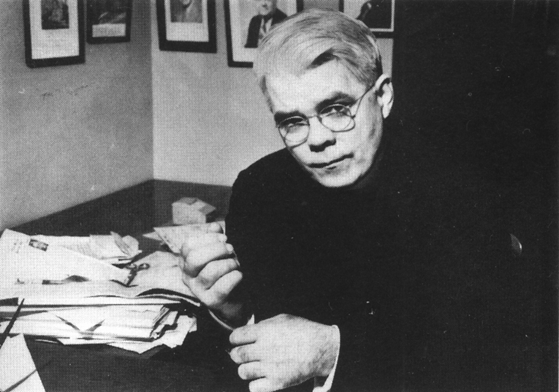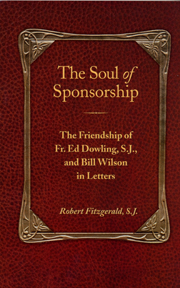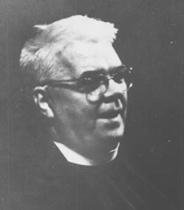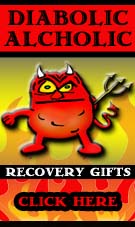Father Edward Dowling

Father Edward Dowling, S.J., the Roman Catholic priest who worked closely with Bill and Dr. Bob in formulating the Steps and the Traditions of Alcoholics Anonymous. Father Dowling was Bill’s friend and Spiritual Advisor.
Bill W. struggled with depression and looked for help outside of the Twelve Steps. Bill began psychotherapy and began a friendship with Father Ed Dowling. This changed Bill’s perspective on the Steps and his understanding of recovery. As a result of this relationship with Dowling and his understanding of phychoanalytic treatment Bill changes his views on recovery. Bill adopts a Psychological View of recovery instead of the Religious Conversion principles he had once thought. This was important as Bill wrote The Twelve Steps and Twelve Traditions after changing to this viewpoint.
�

Father Ed Dowling and AA’s Bill W.
by Robert Fitzgerald, S.J
The Catholic Digest, April 1991
Bill Wilson, co-founder of Alcoholics Anonymous, was down. His feet hung over the end of the bed that nearly filled the small room he and his wife, Lois, had rented above the 24th Street AA Club in New York. It was a cold, rainy November in 1940. Lois, who supported them both with a job at a department store, was out. Bill was wondering whether the stomach pain he was feeling was an ulcer.
The walls were closing in. Thousands of copies of the Big Book were waiting in a warehouse, unsold. A few people were sober, but Bill was frustrated. How could he reach all who wanted help? Nine months earlier, a gathering of rich New Yorkers had come and gone with applause for the young movement, but no money. Hank P., after complaining for half a year, finally got drunk in April. Rollie H., a nationally famous ball-player, sobered up but broke AA’s policy of anonymity by calling the press for a full name-and-photograph story.
Eventually, Bill fell into the same trap as Rollie; he began calling reporters, too, wherever he gave talks. Now he was becoming the center of attention. He had just returned from Baltimore, where a minister had asked him to face the self-pity in his own talk. He was depressed. What if he — five years sober — were to drink?
It was 10 p.m. The doorbell rang. Tom, the Club’s maintenance man, said there was “some bum from St. Louis” to see him. Reluctantly, Bill said, “Send him up.” To himself, he muttered, “Not another drunk. ”
But Bill welcomed the stranger, all the same. As the man shuffled to a wooden chair opposite the bed and sat down, his black raincoat fell open, revealing a Roman collar.
“I’m Father Ed Dowling from St. Louis,” he said. “A Jesuit friend and I have been struck by the similarity of the AA twelve steps and the Spiritual Exercises of St. Ignatius.”
“Never heard of them.”
Father Ed laughed. This endeared him to Bill. Robert Thomsen tells the rest of the story this way in his book, Bill W.:
“The curious little man went on and on, and as he did, Bill could feel his body relaxing, his spirits rising. Gradually he realized that this man sitting across from him was radiating a kind of grace…
Primarily, Father Ed wanted to talk about the paradox of AA, the ‘regeneration,’ he called it, the strength arising out of defeat and weakness, the loss of one’s old life as a condition for achieving a new one. And Bill agreed with everything…”
Soon Bill was talking about all the steps and taking his fifth step (telling the exact nature of his wrongs) with this priest who had limped in from a storm. He told Father Ed about his anger, his impatience, his mounting dissatisfactions. “Blessed are they,” Father Ed said, “who hunger and thirst.”
When Bill asked whether there was ever to be any satisfaction, the priest snapped, “Never. Never any.” Bill would have to keep on reaching. In time, his reaching would find God’s goals, hidden in his own heart. Thomsen continues:
“Bill had made a decision, Father Ed reminded him, to turn his life and his will over to God … he was not to sit in judgment on how he or the world was proceeding. He had only to keep the channels open … it was not up to him to decide how fast or how slowly AA developed … For whether the two of them liked it or not, the world was undoubtedly proceeding as it should, in God’s good time.”
Father Ed continued quoting Bill’s work to him. No one had been able to maintain perfect adherence to the principles. None were saints. They claimed spiritual progress, not spiritual perfection.
Before Father Ed left, he pulled his body up, and leaning on his cane he thrust his head forward and looked straight into Bill’s eyes. There was a force in Bill, he said, that was all his own. It had never been on this earth before, and if Bill did anything to mar it or block it, it would never exist anywhere again.
That night, for the first time in months, Bill Wilson slept soundly.
Thus began a 20-year friendship nourished by visits, phone calls, and letters. Both men spoke the language of the HEART, learned through suffering: Bill from alcoholism, Father Ed from arthritis that was turning his back to stone.
Bill turned to Father Ed as a spiritual sponsor, a friend. Father Ed, in a letter to his provincial, noted that he saw his own gift for AA as a “very free use of the Ignatian Rules for the Discernment of Spirits for the second week of the Spiritual Exercise.”
Thus Father Ed endorsed AA for American Catholics with his appendix in the Big Book and his Queen’s Work pamphlet of 1947. He was the first to see wider applications of the twelve steps to other addictions, and wrote about that in Grapevine (AA’s magazine) in the spring 1960 issue. Bill added a last line to that Grapevine article: “Father Ed, an early and wonderful friend of AA, died as this last message went to press. He was the greatest and most gentle soul to walk this planet. I was closer to him than to any other human being on earth.”
For his part, Father Ed counted many gifts from Bill. He had told his sister, Anna, that the graces he received from their meeting were equivalent to those received at his own ordination. And he thanked Bill for letting him “hitchhike” on the twelve steps. In 1942 he wrote to Bill that he had started a national movement for married couples to help each other through the twelve steps: CANA (Couples Are Not Alone). He used the steps to help people with mental difficulties, scruples, and sexual compulsions.
When chided by an AA member about his smoking, Father Ed stopped with help from the twelve steps and wrote to Bill that as a result he was becoming as “fat as a hog.”
Next, he tried to use the twelve steps with his own compulsive eating. One story of his struggle ends with Father Ed one night eating all the strawberries intended to feed the whole Jesuit Community. He became so sick he had to receive last rites. He went from 242 to 167 pounds and up again like a yo-yo. He asked Bill to start an 00 (“obese obvious”) group.
Often Father Ed spoke of being helped by attending an open AA meeting and wrote to Bill that AA was his “lonely hearts club.” In his last 20 years his ministry changed radically due to AA and his friendship with Lois and Bill. He gave CANA conferences for families, using the twelve steps, once a month from 1942 to 1960. Father Ed knew the steps of AA through inpatient treatment were the only way for relief from alcoholism. He cheered Lois on as she started and continued with Al-Anon. Father Ed rejoiced that in “moving therapy from the expensive clinical couch to the low-cost coffee bar, from the inexperienced professional to the informed amateur, AA has democratized sanity.”
He wrote his superior to free up another Jesuit, Father John Higgins, who was recovering from mental illness, to work with Recovery Inc., a group Dr. Abraham Low had started for people with mental problems. Those groups for mental illness were especially close to Father Ed’s heart as there was a history of depression in his own family. He called people to be “wounded healers” for each other.
Was there anything from the Spiritual Exercises of Ignatius in Father Ed’s gift to Bill? Father Ed pointed out parallels between the Spiritual Exercises and the twelve steps several times, but Bill had written the twelve steps before he ever heard of the Spiritual Exercises.
Father Ed did give Bill a copy of the Spiritual Exercises in 1952, underlining the “Two Standards” meditation. When Father Ed met Bill, moreover, he had called him to the place where he bottomed out and surrendered to his Higher Power. Father Ed believed that this was the place where humiliations led to humility and then to all other blessings. In saying this, he paraphrased Ignatius’s closing prayer of the “Two Standards” meditations.
And this, Father Ed maintained, was where the Exercises become most like AA. He went a step further and invited Bill to make choices based on poverty and humility rather than on money, power, or fame.
This suggestion helped Bill Wilson turn down an honorary degree from Yale. On the packet of letters dealing with his decision, he wrote: “To Father Ed, with gratitude.” In the letter to Yale he stated his reasons for declining the honor:
“My own life story gathered for years around an implacable pursuit of money, fame, and power, anti-climaxed by my near sinking in a sea of alcohol. Though I survived that grim misadventure, I well understand that the dread neurotic germ of the power contagion has survived in me also. It is only dormant and it can again multiply and rend me — and AA, too. Tens of thousands of AA members are temperamentally like me. They know it, fortunately, and I know it. Hence our tradition of anonymity and hence my clear obligation to decline this honor with all the immediate satisfaction and benefit it could have yielded.”
This, then, is where Father Ed met Bill that rainy night long ago, in the small room where bottoming out opens up to life, where humiliations lead to humility — and to all other blessings.
Copyright The Catholic Digest, April 1991
Read more about Father Ed Dowling and Bill Wilson in “Lets Ask Bill W“
Want More on Father Ed?
Read the book “The Soul Of Sponsorship”
 |
This book is available at: or |
|---|
The Soul of Sponsorship explores the relationship of Bill Wilson, cofounder of Alcoholics Anonymous, and his spiritual adviser and friend, Father Ed Dowling. Many might consider that such a remarkable individual as Bill Wilson, who was the primary author of AA literature, would be able to deal with many of life’s problems on his own. Reading The Soul of Sponsorship will illuminate and answer the question of how Father Ed, an Irish Catholic Jesuit priest who was not an alcoholic, was able to be of such great help to Bill Wilson. Part of AA’s Twelfth Step reminds us “to carry this message to alcoholics,” and The Soul of Sponsorship illustrates how sober alcoholics still need the principles of the Twelve Steps brought to them by friends, sponsors, and spiritual advisers. Some of the problems faced by Bill Wilson were: depression in recovery dependency issues whether or not to experiment with LSD the place of money and power in AA knowing God’s plan and will learning from mistakes Father Ed taught Bill the importance of “discernment.” In Father Ed’s Jesuit tradition, discernment was a gift, passed down to him from St. Ignatius, the founder of the Jesuits, who described his own struggle with discernment in Spiritual Exercises of St. Ignatius. The Twelve Steps of AA and the Spiritual Exercises of St. Ignatius presuppose that there is a caring God whose will can be known. The act of tuning in to God’s action at one’s center is discernment. The big question is, how do you know your Higher Power is speaking and revealing Himself through your feelings and desires? What Bill learned from Father Ed can be found in books and articles he wrote for AA. For the good of AA and himself, Bill learned to listen to his desires, be aware of his inner dynamics, and tune into the action of God within. Doing this meant learning to recognize and identify his personal movements — those inner promptings and attractions often called emotions or affections — which are part of ordinary human experiences. The person who helped Bill grow in discernment was Father Ed, the Jesuit priest with a cane who limped into the New York AA clubhouse one sleet-filled November night in 1940. The two “fellow travelers,” Father Ed Dowling and Bill Wilson, gave each other perhaps the greatest gift friends can give: calling on each to know who he is — before God. More details The Soul of Sponsorship: The Friendship of Father Ed Dowling, S.J. and Bill Wilson in Letters By Robert Fitzgerald, Ed Dowling, Bill W. Published by Hazelden, 1995 ISBN 1568380844, 9781568380841 141 pages
Bill W. on Wikipedia speaks of Father Ed and Bill also.

Father Edward Dowling Marking Dred Scott’s Grave Site.
Read about this part of history at common-place.org

Some more great information on Fr. Dowling and parallels between the 12 steps and The Spiritual Exercises at www.ignatianspiritualityproject.org





